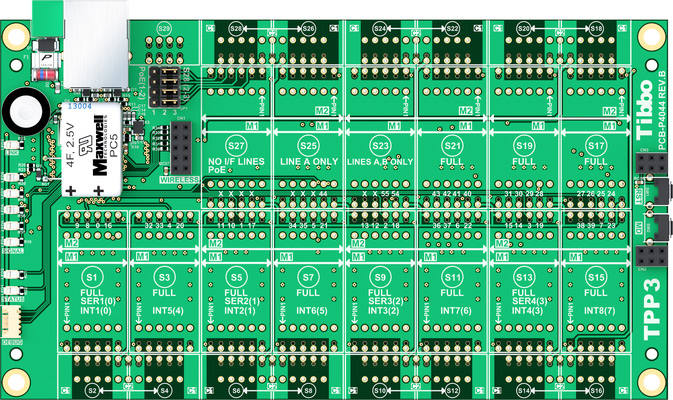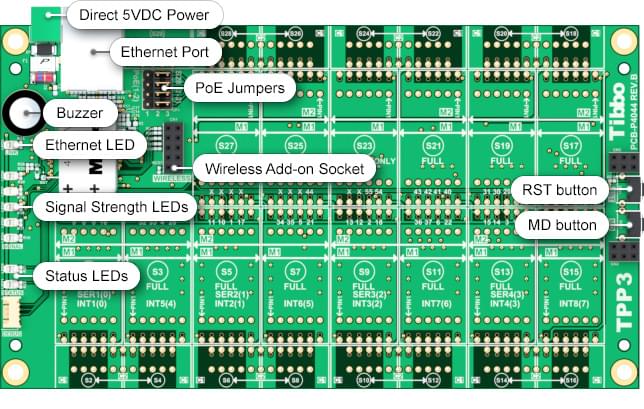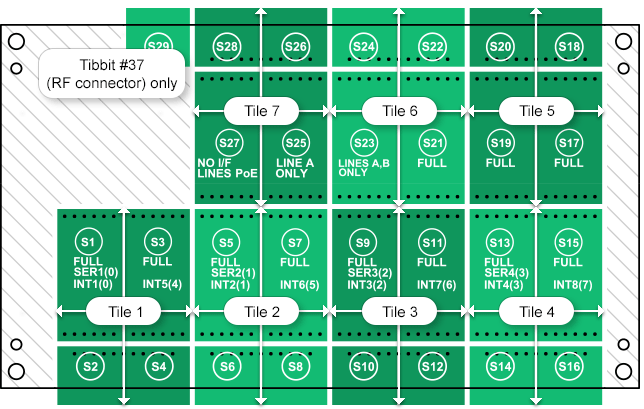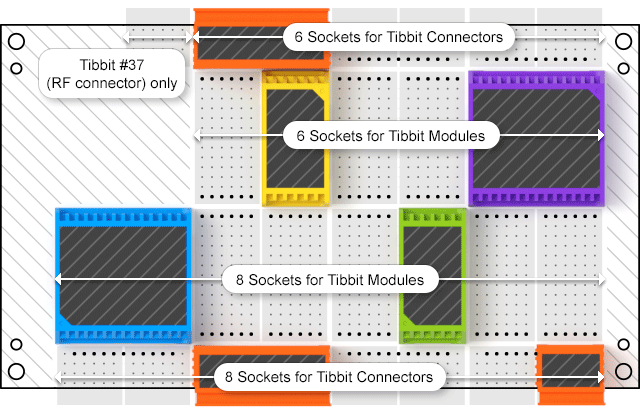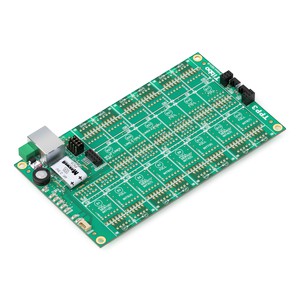Tibbo > Hardware > Tibbo Project System > TPS Mainboards > TPP3
Size 3 Tibbo Project PCB (TPP3)
Size 3 Tibbo Project PCB is a Tibbo BASIC/C-programmable board belonging to the Tibbo Project System (TPS) line.
Offering 7 tiles for a total of 14 Tibbit module and 14 Tibbit connector sockets, the TPP3 can be used to create TPS configurations with up to four full serial ports,
up to 25 relays, or up to 47 control lines, such as opto-inputs, PWMs, or open-collector outputs.
This product can be used as a bare board or assembled into a size 3 Tibbo Project Box (TPB3).
Size 3 Tibbo Project PCB is ideal for applications requiring no human-machine interface while calling for a significant number of I/O lines and functions.
The TPP3 can be used to replace dumb PLC controllers or work as a safety, security, or access control device. The board is also ideal for factory, lab, shop, building, hotel, and home automation projects.
Key Features
 4 UART sockets support serial, Wiegand, and clock/data streams
4 UART sockets support serial, Wiegand, and clock/data streams Onboard buzzer
Onboard buzzer 4 synchronous serial ports with
4 synchronous serial ports with
SPI and I2C modes Onboard RTC with
Onboard RTC with
backup supercapacitor 1MB flash disk for TiOS, application code, and file system
1MB flash disk for TiOS, application code, and file system 2048-byte EEPROM
2048-byte EEPROMCapacity:
- 47 I/O lines
- 7 tiles
- 14 sockets for Tibbit modules
- 14 sockets for Tibbit connectors
- 1 extra socket for Tibbit #37 (RF connector)
Compatible with:
Hardware
Specifications:
- Powered by Tibbo OS (TiOS).
- 10/100BaseT auto-MDIX Ethernet port with RJ45/magnetics.
- Optional Wi-Fi interface (requires the WA2000 add-on module).
- Optional 4G/LTE interface (requires Tibbit #45).
- 7 tiles with 47 general-purpose I/O lines:
- 14 sockets for Tibbit modules;
- 14 sockets for Tibbit connectors;
- 1 extra socket for Tibbit #37 (RF connector);
- 4 Tibbit module sockets have UART capability:
- Baudrates of up to 921,600bps;
- None/even/odd/mark/space parity modes;
- 7 or 8 bits/character;
- Full-duplex mode w. RTS/CTS, XON/XOFF flow control;
- Half-duplex mode with direction control;
- Encoding/decoding of Wiegand, clock/data streams.
- 8 module sockets have interrupt capability;
- 1 module socket has PoE capability;
- 4 remappable synchronous serial ports with SPI and I2C modes.
- Onboard buzzer.
- RTC with a backup supercapacitor.
- 22KB SRAM for Tibbo BASIC/C variables and data.
- 1MB flash memory for TiOS, application code, and file system.
- 2048-byte EEPROM for data storage.
- Eight onboard LEDs:
- Green and red main status LEDs;
- Yellow Ethernet link LED;
- Five blue LEDs (for Wi-Fi signal strength indication, etc.).
- Software-controlled PLL for selecting high or low speed.
- Reliable power-on/ brown-out reset circuit.
- Power: 220mA @ 5V (100Base-T mode, full speed).
- Dimensions (LxW): 165 x 94mm.
- Operating temperature range: -40 ~ +70°C.
- Firmware is upgradeable through the serial port or network.
- Tibbo BASIC/C application can be debugged through the Ethernet LAN.
- CE- and FCC- certified.
See Also:
Programming
Create powerful, network-enabled applications in Tibbo BASIC and Tibbo C. Learn more...
Platform objects:
- beep — generates buzzer patterns.
- button — monitors the MD button.
- fd — manages the flash memory file system and direct sector access.
- io — handles I/O lines, ports, and interrupts.
- kp — works with matrix and binary keypads.
- lcd — controls graphical display panels.
- net — controls the Ethernet port.
- pat — "plays" patterns on up to five LED pairs.
- ppp — accesses the Internet over a serial modem (4G/LTE, etc.).
- pppoe — accesses the Internet over an ADSL modem.
- romfile — facilitates access to resource files (fixed data).
- rtc — keeps track of date and time.
- ser — controls serial ports (UART, Wiegand, clock/data modes).
- sock — socket comms (up to 16 UDP, TCP, and HTTP sessions).
- ssi — controls serial synchronous interface channels (SPI, I2C...).
- stor — provides access to the EEPROM.
- sys — in charge of general device functionality.
- wln — handles the Wi-Fi interface.
Function Groups: 27 string functions, 8 date/time conversion functions, encryption/hash calculation functions (RC4, MD5, SHA-1), and more.
Variable Types: Signed and unsigned 8-bit, 16-bit, and 32-bit types; floating point and string types; user-defined arrays and structures.
Files and Documentation
